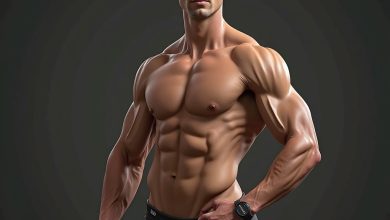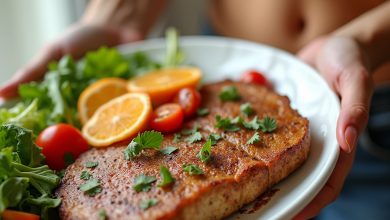
Protein Requirements for Abdominal Fat Loss
Understanding Protein and Its Role in Fat Loss
When it comes to losing abdominal fat, many people focus solely on calories and exercise. However, one crucial factor that often gets overlooked is protein. This macronutrient plays a vital role in weight loss, especially when it comes to shedding those stubborn belly pounds.
Why Protein Matters
Protein is essential for several reasons:
- Muscle Preservation: When you lose weight, you don’t just lose fat; you can also lose muscle. Protein helps preserve muscle mass during a calorie deficit, which is important for maintaining a healthy metabolism.
- Increased Satiety: High-protein foods tend to keep you feeling full longer. This can help reduce overall calorie intake, making it easier to stick to your weight loss goals.
- Thermic Effect of Food: Your body burns more calories digesting protein compared to fats and carbohydrates. This means that incorporating more protein into your diet can help you burn more calories overall.
How Much Protein Do You Need?
The amount of protein you need can vary based on several factors, including your age, sex, activity level, and weight loss goals. A general guideline for protein intake during weight loss is:
- For sedentary individuals: Aim for about 0.8 grams of protein per kilogram of body weight.
- For active individuals: This can increase to between 1.2 and 2.0 grams per kilogram, depending on the intensity of your workouts.
For example, if you weigh 70 kilograms (about 154 pounds) and are moderately active, you might aim for around 84 to 140 grams of protein per day.
Best Sources of Protein
Not all protein sources are created equal. To maximize your abdominal fat loss, focus on high-quality protein sources, such as:
- Lean meats: Chicken, turkey, and lean cuts of beef and pork.
- Fish: Salmon, tuna, and other fatty fish are excellent sources of protein and healthy fats.
- Dairy: Greek yogurt, cottage cheese, and low-fat cheese provide protein along with calcium.
- Plant-based proteins: Lentils, chickpeas, quinoa, and tofu are great options for vegetarians and vegans.
Incorporating Protein into Your Diet
To meet your protein needs, consider these tips:
- Start your day with protein: Include eggs, Greek yogurt, or a protein smoothie for breakfast.
- Snack smart: Choose high-protein snacks like nuts, protein bars, or edamame instead of chips or cookies.
- Plan your meals: Incorporate a protein source into every meal. Try to balance your plate with proteins, healthy fats, and carbohydrates.
Combining Protein with Exercise
While protein is essential for fat loss, it works best when combined with regular exercise. Incorporating strength training into your routine can help build muscle, which in turn boosts your metabolism. Consider these exercise tips:
- Strength training: Aim for at least two sessions per week, focusing on major muscle groups.
- Cardiovascular exercise: Include activities like walking, running, or cycling to help burn calories and improve heart health.
- Stay active: Everyday activities like walking or taking the stairs contribute to your overall calorie expenditure.
Conclusion
In summary, protein is a crucial component of any fat loss plan, particularly when it comes to targeting abdominal fat. By understanding your protein needs, choosing high-quality sources, and combining your dietary changes with regular exercise, you can effectively work towards your weight loss goals. Remember, every small step counts, so start incorporating more protein into your meals today!




